William “Bill” Earl Gordon was born July 27th, 1890 in Drayton, Ontario. His father, William Henry Gordon was an analytical man and a lawyer, which set the foundation for William’s career as an accountant and financial advisor, as well as in politics.
Early Life
At the age of three, William’s family moved to Wiarton, Ontario where they lived for three years before moving to Fergus, Ontario. In 1899, William’s father died from tuberculosis at the age of forty-one. William’s mother, Alva, then raised seven children, all under the age of eleven.
William’s mother, Alva was organist and choirmaster at their Fergus church and William was the organ pumper.
“The duties were well and truly performed except on the occasions when the Minister’s sermon was somewhat on the dry side. At such times the organ pumper would invariably be overcome by sleep, a condition which Mrs. Gordon remedied by a simple experiment of throwing a book at him. There are indications that the lady was an expert shot.” – ‘Who’s in the News,’ Selkirk Enterprise, 1949.
Working Life
After graduating high school, William found work at the Dominion Bank in Guelph. He was often homesick and would ride thirteen miles home after work just to have a warm dinner and a familiar bed before getting up early the next day to ride back. He filled his leisure time with sports such as hockey, baseball, lacrosse, and rugby, but was especially proficient at lacrosse.
In 1913, he moved to Calgary to work as Manager for a printing and lithography firm. In 1915, the Calgary firm went out of business, so William accepted an Assistant Inspector position with the Dominion Bank in Winnipeg. He spent the next four years in Winnipeg before transferring to Selkirk as bank manager in 1919. He held this position until 1930 when he opened his own accounting and financial advising business.
Family Life
William and Dorothea Ewald MacDonald, of Guelph, Ontario, married on February 24th, 1914 in Calgary, Alberta. Their first son, William Frederick was born on April 9th, 1915, in Cleveland, Ohio while Dorothea was visiting her sister. After William’s birth in 1915, came John Russell “Jack” in 1917, Hugh Clyde in 1919, Macdonald “Donald” Stuart in 1920, and Helen Mary in 1925.
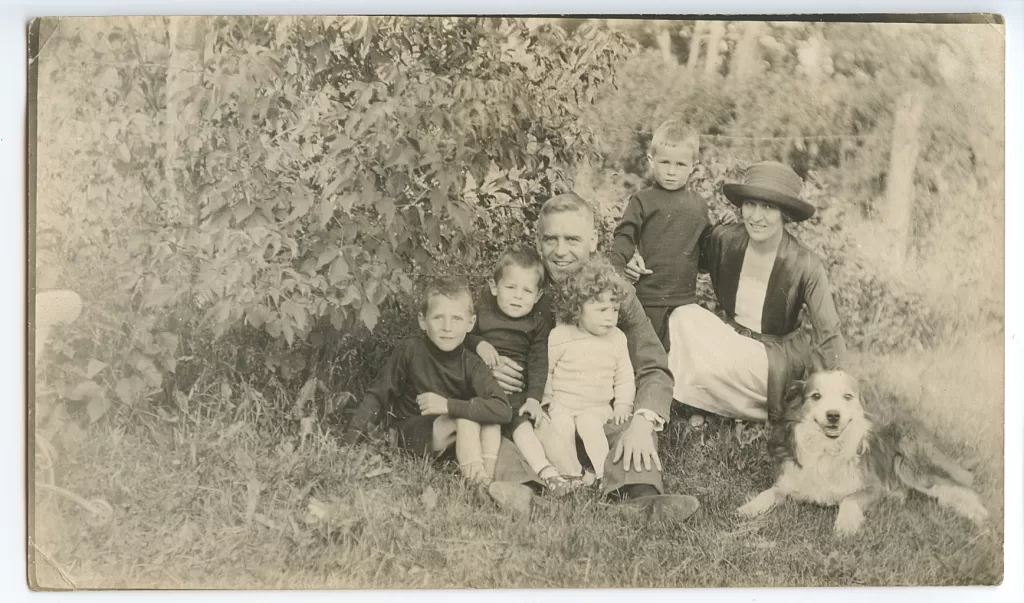
Dorothea died in 1928 from pneumonia at age 38. She left behind five children under the age of thirteen. William married a second time in 1936. Ruth Eliza Willey was a schoolteacher at Devonshire Collegiate Institute in Selkirk. They had one son, Barry Arthur in 1939.
Two of his sons, William Frederick Gordon and Macdonald “Donald” Stuart were killed in action during World War Two. William Frederick enlisted with the Royal Canadian Air Force in 1940. He was with the 7th Squadron, Warrant Officer 2nd Class. William’s plane was shot down in November 1942. William had recently married Maude Elizabeth Poulter in 1940.
MacDonald enlisted with the Royal Canadian Air Force in 1941. He was with the 199th Squadron, Flying Officer. MacDonald’s plane was shot down in September 1943. He never married. William and MacDonald’s names are listed on the monument at the Veterans Memorial Gardens in Selkirk, as well as on the Runnymede War Memorial in England.

Years of Public Service
The Depression took its toll, and after three years of attempting to run a business, William accepted temporary duties at the Town Office as an accountant. His position became permanent, and he stayed until 1946. In 1948, he was elected Mayor and remained Mayor until 1950.
However, William’s ventures in politics had begun much earlier than 1948 when he campaigned for the Canadian House of Commons in the 1935 Federal election as a candidate the Reconstruction Party of Canada. He finished fifth out of six candidates.
In 1949, William ran for a seat in the Manitoba Legislature Provincial election as the CCF candidate in St. Andrews. He lost to Progressive Conservative coalitionist James McLenaghen. In 1950, he ran again and finished second to Liberal-Progressive candidate Thomas Hillhouse.
In 1948, as Mayor, William, along with J. C. Erikson, participated in the sod-turning ceremony for the new Selkirk Arena. One year later, he spoke at the ribbon cutting ceremony to open the rink. William was a strong supporter of the new rink, having had a great interest in sports his whole life. Later, in 1951, he participated in the sod-turning ceremony for the construction of Memorial Hall.
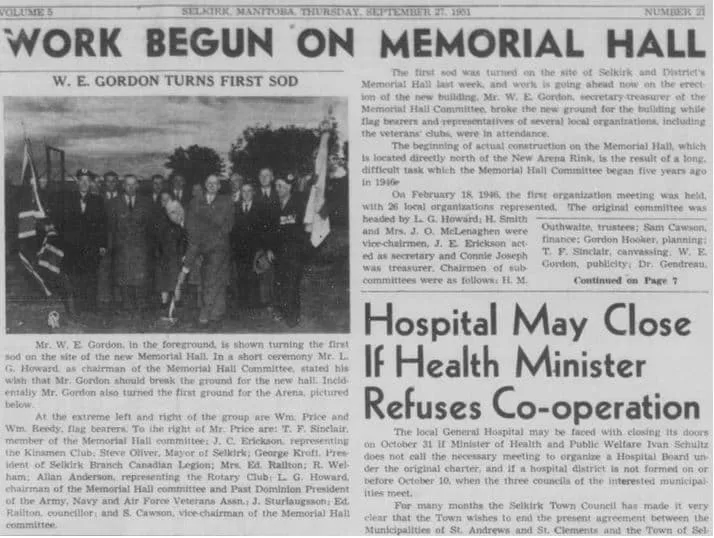
William was very involved in the community and was a “dynamic forceful worker for the welfare of the people.” During his 34 years in Selkirk, he was never without an executive position. Positions he held were: Mayor of Town of Selkirk from 1948-1950; President of the Board of Trade for five years; secretary-treasurer of his church for 25 years; Director of the Hospital Board; Secretary of the Red Cross for over 30 years; Treasurer of the Credit Union for 8 years; member of the Rotary Club for 8 years; Secretary of the Golf Club for two years; served the Agricultural Society for 27 years.
William Earl Gordon died on March 11th, 1953 at age 62.
William Earl Gordon Collection


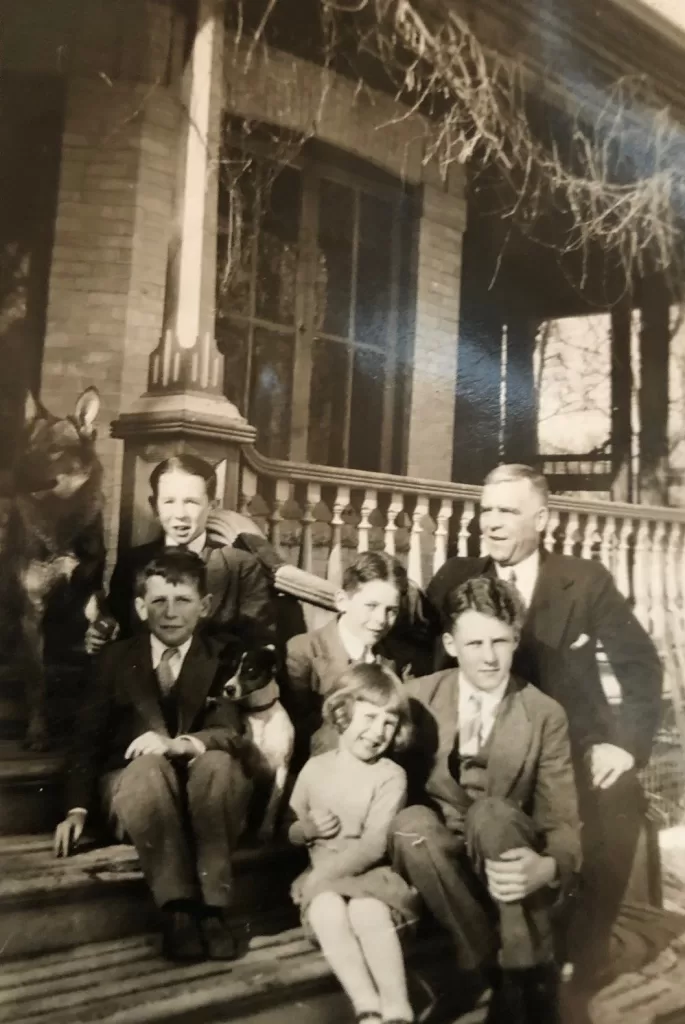
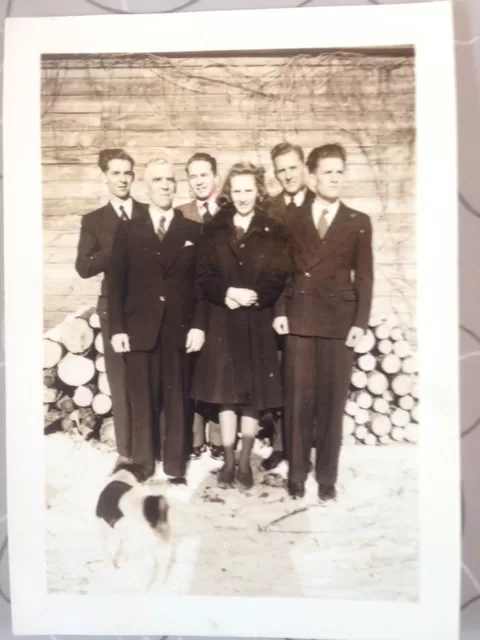

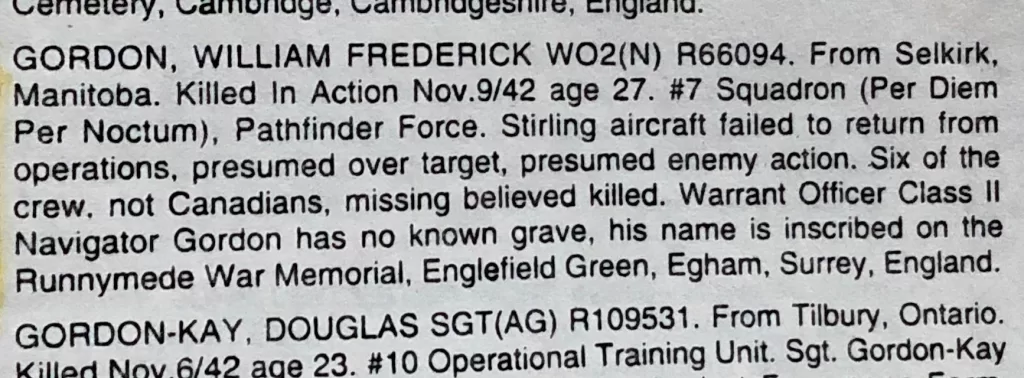
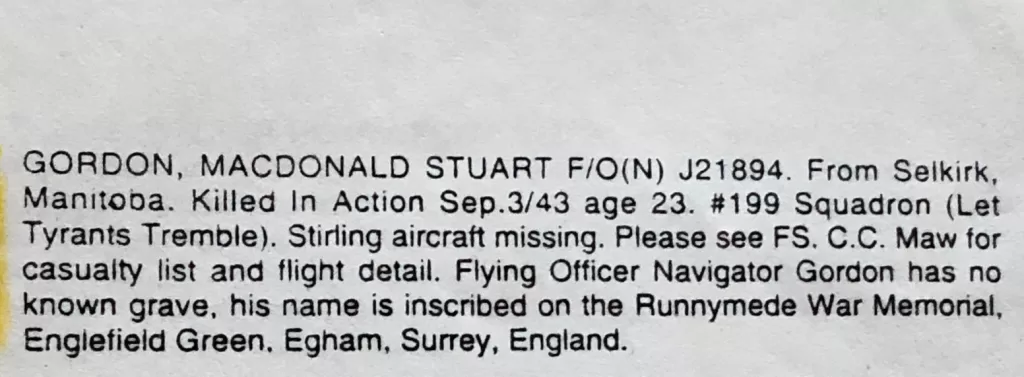
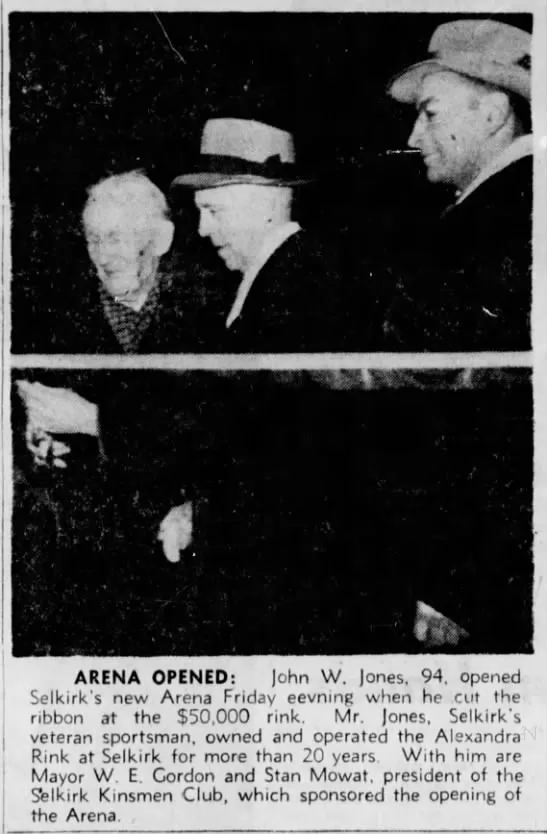

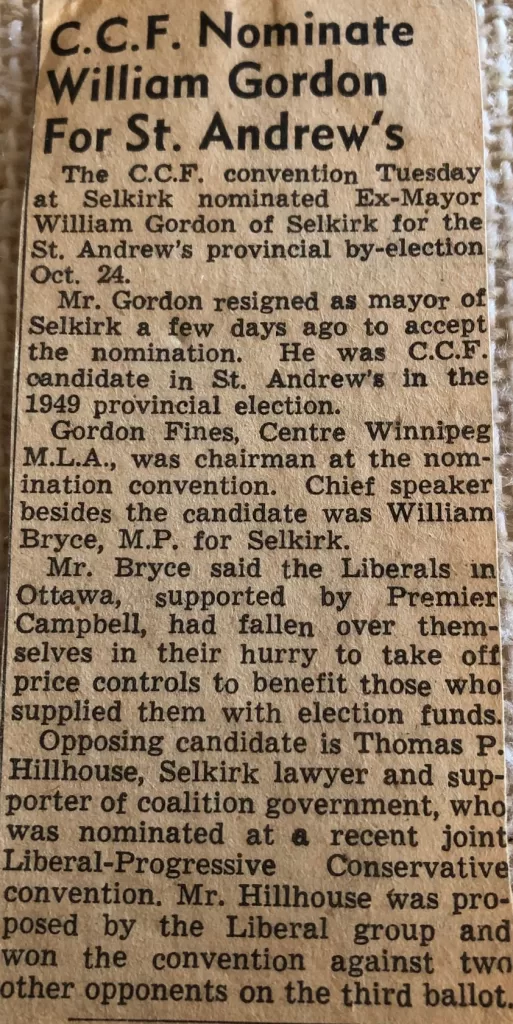
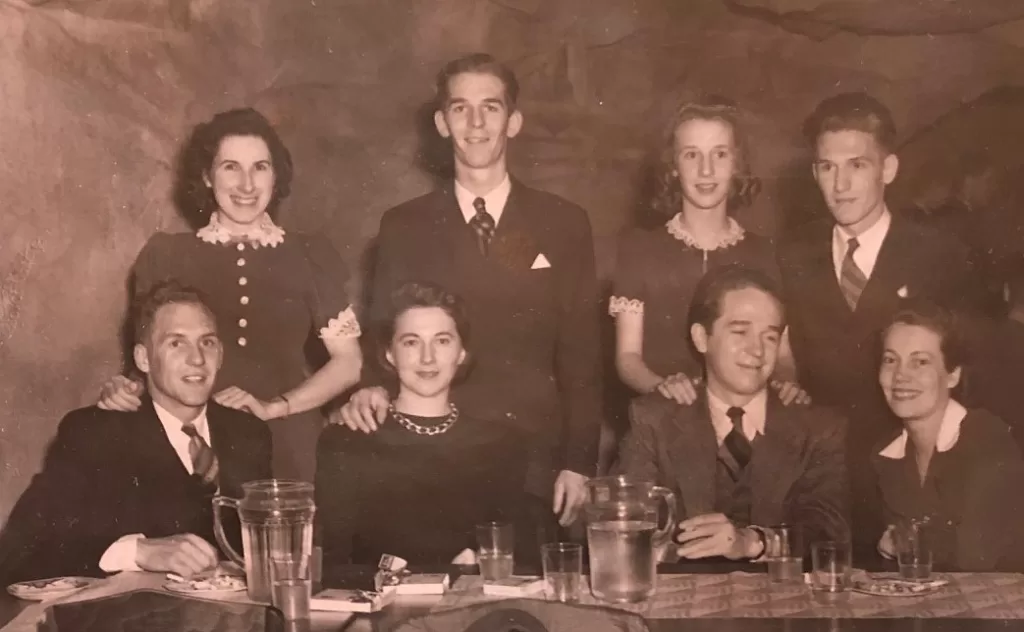

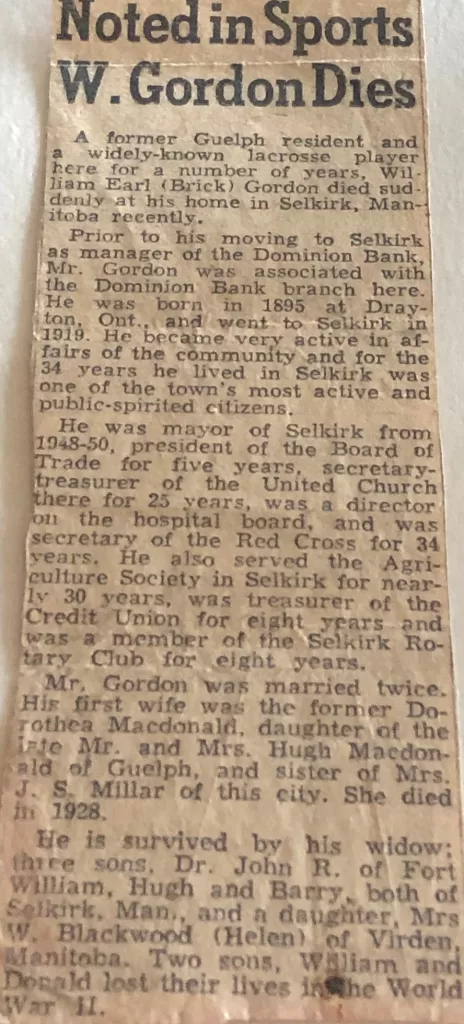
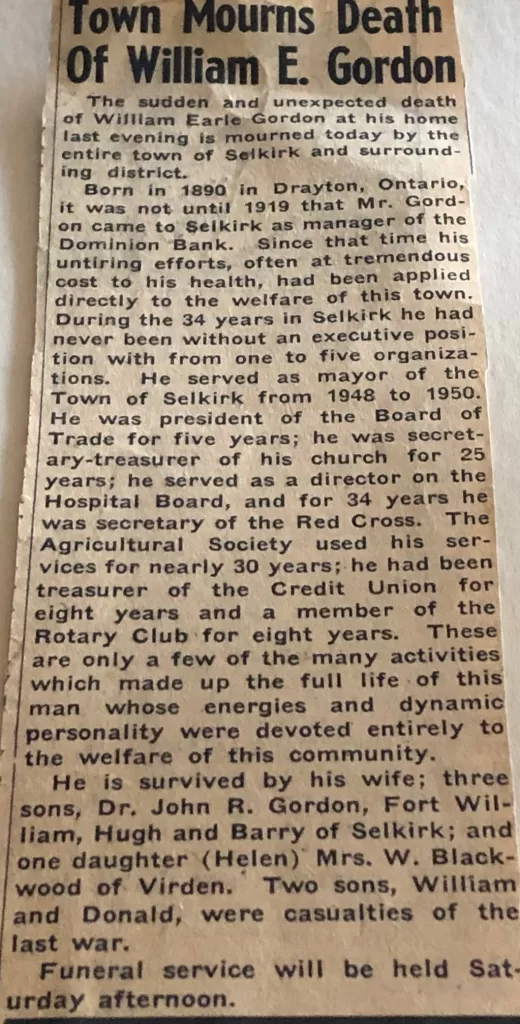
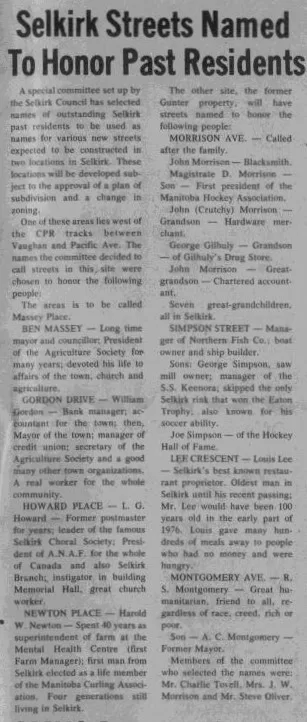

Sources
Selkirk Enterprise 1949, 1954, 1976
Selkirk Museum, Jemima Street Runk
Selkirk Museum, Memorial Hall
Geoff Blackwood writeups and resources

